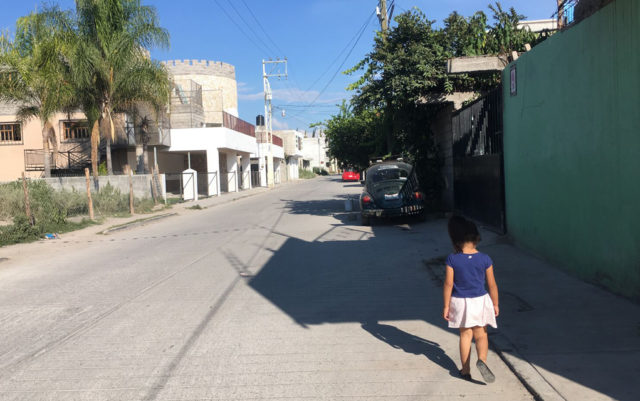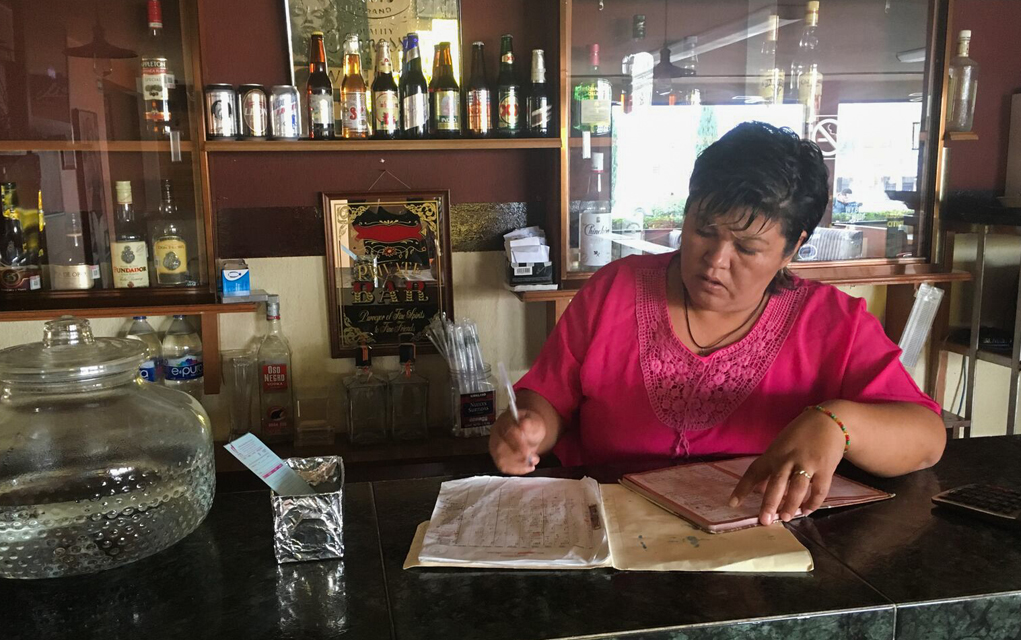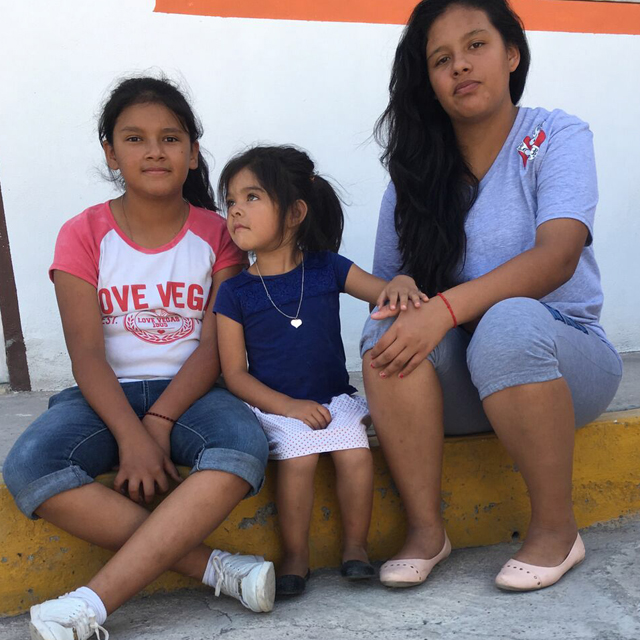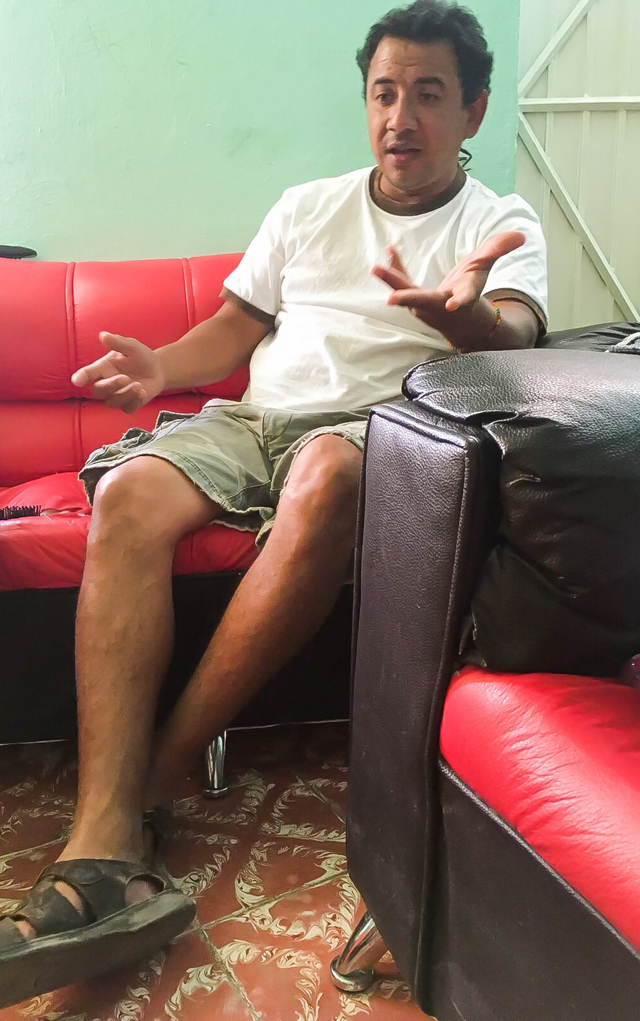
Editor’s note — We first met and reported on the Guerrero family in January 2015. Luis was being held in detention while his wife Sofia and their four children — Andy, Jenny, Melody and Lucy — struggled to get by in his absence. Shortly thereafter we reported that Luis had been suddenly deported to Mexico without any prior notice to his family. That is where our previous reporting stopped.
Eventually, Sofia had little choice but to take her three youngest children, all U.S. citizens, to Mexico in an effort to keep the family together. Her oldest child, Andy, remained in the U.S. to finish high school and hopefully attend college. Needless to say, it’s been a very difficult transition for them.
Last year, we sent Angela K. Evans to a small town north of Mexico City to reconnect with the Guerrero family. She has also stayed in touch with Andy, who still lives in Colorado.
This is the conclusion of our three part series. Read the first two installments here.
I meet Andy in downtown Denver at a Starbucks close to the bus station. It’s a brisk fall day and we’re both eager to get out of the wind. He’s just arrived after traveling all day via Greyhound from Grand Junction, where he recently started attending Colorado Mesa University.
He asks about his parents and younger sisters, immediately tearing up when I show him photos of my recent visit to see them in Ixmiquilpan, Mexico. Taking off his glasses to wipe his eyes, he chuckles, embarrassed by his own emotion. It’s the first of many pauses he takes to compose himself during our conversation.
Andy hasn’t seen his family in person for more than a year. Since returning from summer break in Mexico in August 2015, he doesn’t trust himself to visit them. He’s afraid he won’t want to leave them again and all the hard work he’s put into school will be lost.
He returned to Aurora that August to finish high school and moved into a spare room in a friend’s house. The family was supportive, encouraging him in school, not asking for rent. But Andy remained on edge, constantly afraid it wasn’t going to work out, like it hadn’t so many times before.
“That was a fear that I had everyday,” he says.
Andy finally had a comfortable place to live, but it didn’t mean it felt like home.
He went back to his job at Best Buy, working 40 hours a week in addition to his schoolwork.
He tried his best to enjoy his senior year, attending sports events when he could and dancing at his prom. But there was also a lot he couldn’t do. He had to quit the wrestling team. He didn’t go to parties or out to eat with his friends.
“Even to this day, I don’t go out much,” he says. “If [my family] is there [in Mexico] living a strict life, not going out, then I don’t want to be here partying.”
The separation from his family and his austere lifestyle made for a difficult ending to high school, but before he knew it, it was over.
He had graduation and scholarship ceremonies to attend, celebratory events that felt empty without his family by his side. It was hard watching as his friends and classmates celebrated with their loved ones.
He talked to his parents on the phone, but even that felt clouded by the fact they couldn’t be there with him in person.
Instead of visiting them in Mexico, he spent the summer of 2016 preparing for his move to Grand Junction and working at Elitch Gardens in Denver. The job was a constant reminder of the summer days he had spent with his family at the amusement park. Before the park would open, he’d test the roller coasters, thinking back to the fun he’d had with his family on their favorites like Shipwreck Falls.
“My dad would scream every time we would get on it. My mom just loved it,” he says. “And I would get on it [at work] and memories would just come pouring into my head.”

As the summer came to a close, Andy knew it was time to leave Denver, start school and finally achieve the dream he had worked so hard for. It was a dream he always shared with his dad. Since childhood, Luis had promised Andy that if he went to college, he’d be the one to personally help him move.
“He told me that he was going to drop me off no matter where it was,” Andy says. “I could have even gone to the other side of the country and he would have taken me and left me right at the door.”
Andy never lost hope that his dad would be there when moving day arrived. He held onto it through the months Luis was held at the detention facility in Aurora. He never let go of it even after his family had been in Mexico for a year. Even in the face of such insurmountable obstacles, he believed that somehow his dad would be the one to drop him off at school.
“But it didn’t happen. As the days got closer, I was just like, ‘It’s not happening,’” Andy says. “That day was really emotional. Basically, I had achieved my goal but he wasn’t the one who took me.”
Instead, the program director from Boy’s Hope, along with her husband, helped Andy move, driving him to Grand Junction, helping him set up his dorm room, unpack his new life.
“They acted like my parents,” he says. “I’m really thankful for that.”
When they left, Andy tried to call his parents in Ixmiquilpan but the call never went through. He was on his own.
“It was tough,” he says. “I just had to go in with a different mentality: that this is going to be great. I’m going to get this done.”
At first, Andy talked to his mom Sofia almost every other day, but it has become increasingly less since she started her job at the hotel and he started college. Plus, conversations with his family tend to make Andy emotional. “There’s just times that I don’t want to talk too much, I don’t want to say too much that I’ll end up crying,” he says. “So that’s the thing.”
Regardless, he’s adjusting to college life, finding camaraderie in the Latino Student Alliance, and the Newman House, a group of Catholics on campus. This spring he became an RA in the dorms, and he may have found a way for his sister Jenny to come back to the states and live with a friend in an off-campus apartment close to the dorms. But the logistics of getting her into high school with their parents still in Mexico are daunting. Ideally, he’d like all his sisters live with him in Colorado.
It’s a tall order for the 18-year-old. “Whenever I have something settled then I would want to bring them back,” he says, trailing off, recognizing the problems in such a statement.
• • • •
In many ways, Jenny is like any other 15-year-old born in the U.S. Her cell phone is constantly buzzing either with messages from friends in Colorado or group texts from friends in Ixmiquilpan. Sometimes Andy calls, other times she listens to music. If there’s internet, she’s looking at Facebook and Snapchat, eager to see what people are doing while she’s at home with her family.
She bought the phone herself, after starting a job at a lively restaurant on the plaza in Ixmiquilpan. Sometimes she cooks, mostly she serves. After that she cleans, closing up around 2 or 3 in the morning when everything is done. She laughs and jokes around with her coworkers, calling them her brothers as they tease her relentlessly.
Jenny waits for either her mom or dad to pick her up in the middle of the night, sitting on any number of benches or short stone walls in the plaza, mostly thinking about home in Colorado.
“There are a lot of memories we have [as a family] and some just make you want to go back,” Jenny says. Her parents had more free time when they lived in Aurora, and she misses going to the movies together or playing games in the backyard. She’s obviously conflicted about her choice to leave behind her life in Colorado and join her dad in Mexico after his deportation.
“We’re more united as a family,” Jenny says. “But it was a bad decision to come here.”
Sofia adds, “She (Jenny) didn’t want to stay (in Colorado), but now she wants to go back.”

Like her daughter, Sofia too spends a lot of her time questioning the decisions she’s made over the last 20 years, wondering if she took advice from the right people, chose to do the right thing.
Neither Sofia nor Luis had ever tried to apply for residency in the U.S. Although she had a work visa for 10 years, she remained in the U.S. past its expiration, afraid if she returned to Mexico to renew it, the authorities wouldn’t let her back. Maybe that was a mistake, Sofia admits.
“This is where we made mistakes because we never take information from the right people,” she says.
Regardless, neither she nor Luis found it difficult to work. And they say they always paid their taxes, or at least since 1996 when the federal Individual Taxpayer Identification Number (ITIN) program was launched, giving nonresidents an identifying number to fill out IRS forms. A new report from the Institute on Taxation and Economic Policy estimates Colorado receives $139.5 million per year in taxes from undocumented residents. This includes income and property taxes, as well as sales and excise taxes. Nationally, this number is $11.74 billion in state and local taxes each year.
“I’ve worked there for so long and I didn’t need papers,” Luis says. “For so long, I paid taxes and [the U.S.] never gave me anything back.”
“It’s the law, of course we paid,” Sofia adds. “They wanted money and they took our money.”
And they both used the ITIN numbers to start their own businesses. To this day, Sofia doubts the way she encouraged Luis to start his subcontracting business just a few months before he was detained by ICE in 2014.
“Maybe I was wrong,” she says. “Maybe if he hadn’t started his own company, maybe they wouldn’t have detained him.”
But her biggest questions are about the future of her daughters. Four-year-old Lucy will now grow up in Ixmiquilpan without many of the benefits of her U.S.-citizenship. (All of the children were born in the U.S.)

Nine-year-old Melody has already struggled to adjust to school in Mexico, despite her diligent efforts. She’s a dedicated student, waking up on the weekends and doing her homework before anyone else is even up.
During my visit last August, I offer to play a game with her. She jumps at the chance, pulling out an old Jenga set, several pieces missing, others half-chewed by the pet rottweiler they had to leave behind in Aurora. Too young for social media, she talks about the friends she misses from her school back home, wondering what they’re learning in school or if they’ve joined the soccer team like she had hoped to do.
At some point, she asks, “Who are you voting for?”
The question catches me off guard, the U.S. election seems a world away from her new life in Ixmiquilpan. But for a family relocated by deportation, the next election is never that far away.
“I was outside, stealing the neighbor’s internet to try and download games and this came up,” she says, showing me her phone screen with a “Punch the Trump” game open. The goal is simple: tap the screen as fast as you can to punch Donald Trump in the face until you’ve beaten him.
“I just typed in fun games and this is the first thing that came up,” she says.
It’s still a few months before the U.S. election and her family’s saga seems more pertinent than ever in the midst of the increasing anti-immigration rhetoric in the U.S.
• • • •
There’s an estimated 11 million undocumented immigrants in the United States, the vast majority of them from Mexico, like Luis and Sofia. Most of these people have lived in the U.S. for more than a decade, leaving behind their country of origin, families, culture and homes in hopes of building a better future here. They’ve had to choose between their two lives — lives divided by the often-invisible border between Mexico and the U.S.

Like Luis, many have been forced to choose between dying parents in Mexico and young children in the U.S. They’ve left spouses behind and risked their lives to walk across the mountains, deserts and the river that separate the two countries. Some have come for economic reasons, drawn by employers who offer work without documentation, who pay more than they could ever expect to make in Mexico. Others have left behind dangerous, often violent circumstances, drawn by the promise of safety and security embodied in the United States’ reputation. They have often fled poverty for a chance at a better life, only to be met with growing hostility north of the border.
As the U.S. political climate has become increasingly polarized, the most marginalized communities are the ones caught in the wake. Since the 1980s, the federal government has tried to enact comprehensive immigration reform that both slows the flow of migrants from the south while acknowledging the country’s immigration history by recognizing the undocumented population already living in the U.S. Though both Ronald Reagan and Bill Clinton were able to pass some sort of legislation, it was not without major flaws that did little to rectify the real issues of illegal immigration.
George W. Bush was elected at the turn of the century with a platform of immigration reform that he never saw come to fruition, in large part because of the 9/11 terrorist attacks. His successor, Barack Obama, deported more unauthorized immigrants than any other president in history, roughly 2.5 million, relying largely on an immigration detention system that housed up to 450,000 people each year, according to some estimates. And although members of Congress attempted comprehensive immigration reform several times in the last eight years, the measures failed each time, despite some bipartisan support.
“Things happen everyday with immigration and yet no one knows about it. It’s something that is going on under the carpet and nobody really knows about it,” Andy says, struggling to understand what his U.S. citizenship means in the context of his family’s experience.
Listening to the annals of freedom and democracy in U.S. history class, Andy hasn’t been able to reconcile what the history books tell him our country is and what he’s experienced our country to be.
“From my perspective, it’s all fake,” he says. “You say it to say it, but you really don’t walk the walk. If you’re going to say something [like that] then you have to really mean it. This is what we’re doing, this is an example, this is why we can say we are the best country. … We say it but there’s nothing that proves it’s actually going on.”
In many ways, Andy blames the federal government for the situation his family is in, failing to provide a pathway to legal residency or citizenship for so many people that have contributed to U.S. society over decades of living here.
“If you want people to be here legally, why don’t you make it easier so we wouldn’t be going through these things or seeing children who are citizens seeing their families ripped apart,” he says.
For him, his citizenship has become nothing more than a piece of paper, one that can fold, rip or even be thrown away. He puts more stock in the character of his father, the values of his family and the morality of seeing the world with compassion and empathy than he does in his citizenship. A piece of paper is less important than going with his family to pass out tamales to the homeless in Denver.
• • • •
Andy voted for the first time in the 2016 election, turning 18 the summer before. For him the choice was obvious given Donald Trump’s remarks and policy proposals concerning undocumented immigrants and first-generation Latinos, people like him and his family. Still, the rhetoric of the Trump campaign exposed what Andy had seen his whole life.
“It’s going to be horrible if he wins,” Andy told me last fall, before Trump’s victory. “But if he wins, then that’s when we’re really going to know what we are. It will show our true face, our true colors.”
Despite the fact that Obama’s immigration policies drew years of criticism, Donald Trump was elected with the most severe anti-immigrant platform of any candidate in modern history. Since taking office on Jan. 20, 2017, he’s enacted sweeping executive orders targeting the vast undocumented community. He’s proposed doubling the daily capacity of immigration detention from 41,000 to a possible 80,000 people a day, guaranteeing the private corporations that run many of the immigration detention centers profits for years to come. Such an increase could translate to locking up nearly 750,000 immigrants a year.
The U.S. government is already investing a record amount of tax-payer dollars on immigration enforcement, almost $20 billion for fiscal year 2017 (which ends September 30). In March, the Trump administration asked for an additional $3 billion this year to begin funding new detention facilities, hire more immigration enforcement agents and begin construction of the infamous border wall. It’s expected his 2018 budget will ask for even more funds for his policies that criminalize undocumented immigrants and call for mass deportation.
As the new president continues to dig his heals in, millions more people will find themselves in the same position as the Guerrero family, forced from a better life in the U.S. to a far more challenging one in Mexico. It’s a life both here and there, an existence separated by a border that in many ways was ignored for centuries, despite it’s recent spotlight.
The border has become more about decisions than a political boundary to be navigated. Where will a family live? Which members will live in what country? Does the risk of prison outweigh the pain of poverty and the reality that opportunity may never knock at your children’s door? No one should be forced to make such choices, but millions more people may have to unless we come to our senses, and soon.














